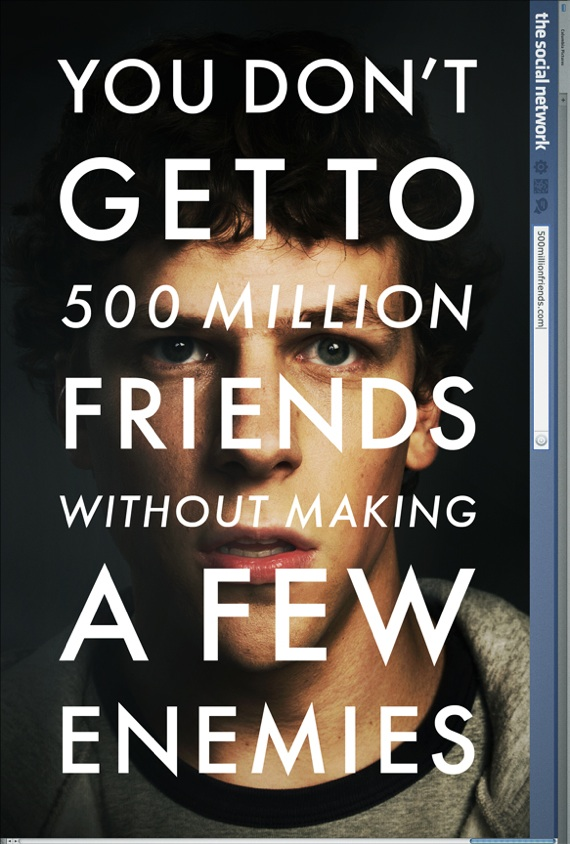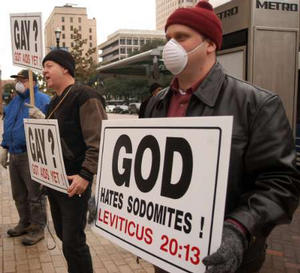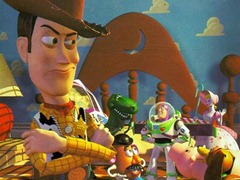Spoiler alerts! If you haven’t seen True Grit, you may want to shy away from this review, as it’s got quite a few spoilers (major and minor) in it. You have been warned…
 True Grit is the latest offering from the Cohen brothers (The Hudsucker Proxy, Fargo, O Brother Where Art Thou, No Country for Old Men), and it’s an adaptation of the same Charles Portis book as the 1969 film for which John Wayne won his Oscar. The film is a profound meditation on what vengeance, redemption and justice look like in a world without God.
True Grit is the latest offering from the Cohen brothers (The Hudsucker Proxy, Fargo, O Brother Where Art Thou, No Country for Old Men), and it’s an adaptation of the same Charles Portis book as the 1969 film for which John Wayne won his Oscar. The film is a profound meditation on what vengeance, redemption and justice look like in a world without God.
True Grit opens on a dead body lying in the snow, while the old gospel song “Leaning on the Everlasting Arms” plays in the background. A 40-year old Mattie Ross tells us that the body is her father, and that when she was 14 years old, he was murdered by the outlaw Tom Chaney (Josh Brolin). This, then, is the story of how Mattie (played at 14 by Hailee Steinfeld) avenges her father’s death. Mattie – who is quickly revealed to posses a bravery and self-assurance rare at any age – justifies her quest to her audience by claiming that
There’s consequences for everything we do in this world, one way an’ another.
Nothing’s free but the grace of God.
Mattie sees herself as God’s instrument of justice – justice in this case being Tom Chaney’s death. This conviction steels Mattie against the adult world she encounters: her bravery may in fact be the ignorance of the innocent. Mattie is convinced she lives in a world of black and white, where right is right and wrong is wrong, and where no one can escape the consequences of their actions. She pursues the outlaw Tom Chaney with the conviction of the righteous, telling her mother not to worry because
“Though I walk through the valley of the shadow of death,
the creator of all things watches over me.”
Mattie knows that Chaney must die in order for her world to be right, and she is also well aware that human law may fail her. Thus she is willing become that instrument of divine judgment, delivering to Chaney the right and proper punishment not according to the laws of humanity, but the laws of God. When asked what she plans to do with her father’s gun, she states plainly,
I aim to kill Tom Chaney. If the Law fails to do so.
 This is a child, an innocent, in an adult world. As she prepares to follow Chaney, Mattie dresses in her father’s clothes, tailoring them so that they’ll fit her well enough. Throughout the rest of the film, they serve as a reminder that she is a dove among serpents, a sheep among wolves.
This is a child, an innocent, in an adult world. As she prepares to follow Chaney, Mattie dresses in her father’s clothes, tailoring them so that they’ll fit her well enough. Throughout the rest of the film, they serve as a reminder that she is a dove among serpents, a sheep among wolves.
Chaney has fled into the Indian Nations, so the local law will not pursue him; Mattie seeks out Reuben “Rooster” Cogburn (the Duke’s role, now played masterfully by Jeff Bridges), the meanest U.S. Marshal around, to apprehend Chaney with her. Rooster is a drunk Civil War veteran who’s missing an eye and prefers killing men rather than trying to bring them in alive. But even Cogburn bends to the righteous will of little Mattie Ross. Mattie and Cogburn move steadily into the wild of Indian Territory and closer to the inexorable confrontation with Chaney (accompanied sporadically by Matt Damon’s Texas Ranger LaBoeuf – pronounced ‘La Beef’).
Finally, Mattie stands atop a mountain, gun on Chaney, ready to enact vengeance, mete punishment and acquire justice. Even here, Mattie’s righteous self-assurance never wavers. Without batting an eye, Mattie demands,
“Tom Chaney, stand up,” and fires, killing him.
The force of Mattie’s shot, the very action of vengeance-taking, knocks her back into a deep cavern. She’s caught by a root, hanging upside down, struggling to get free. She reaches for a dead body on a ledge near her, wanting its holstered knife to cut herself free. But as she drags the body towards her, the ancient clothes tear away, revealing a brood of rattlesnakes hibernating in the corpse’s chest cavity. One of the snakes bites her hand, sentencing her to Death.
Finally the visual and thematic elements of the film congeal into some version of the Christian story. Mattie kills, and that action destroys her innocence. That sin casts her into a pit from which she cannot escape – in fact, every action only brings her closer to death until a snake bites her. Mattie’s Messiah comes in the form of Cogburn, who rappels down into the cave, sucks the poison out of Mattie’s hand and races her to a doctor.
 At the beginning of the film, Mattie claimed that,
At the beginning of the film, Mattie claimed that,
There’s consequences for everything we do in this world,
one way an’ another. Nothing’s free but the grace of God.
 Certainly this is true for the characters that inhabit True Grit, and the consequences are born on their bodies. Rooster Cogburn is clearly a grey character, and is missing an eye. LaBoeuf nearly bites off his tongue and speaks with an impediment for the rest of the film. Chaney has a black blemish under his eye – his defining mark in the film. A dentist buys a dead body, removes the teeth and offers to sell the body to Mattie and Cogburn. An outlaw has his fingers cut off by another outlaw just before Cogburn shoots him in the face, prefiguring Chaney’s blemish. As the film closes, we see that Mattie Ross has borne the consequences of her vengeance as well – the snakebite cost her her left arm.
Certainly this is true for the characters that inhabit True Grit, and the consequences are born on their bodies. Rooster Cogburn is clearly a grey character, and is missing an eye. LaBoeuf nearly bites off his tongue and speaks with an impediment for the rest of the film. Chaney has a black blemish under his eye – his defining mark in the film. A dentist buys a dead body, removes the teeth and offers to sell the body to Mattie and Cogburn. An outlaw has his fingers cut off by another outlaw just before Cogburn shoots him in the face, prefiguring Chaney’s blemish. As the film closes, we see that Mattie Ross has borne the consequences of her vengeance as well – the snakebite cost her her left arm.
Mattie is no longer a dove; she has become a wolf.
Imperfect vengeance and incomplete salvation seem to be the best characters in the world of True Grit can hope for. While Mattie gives lip-service to God’s grace, it’s nowhere to be found in this movie. Justice only comes to those who are strong enough to take it. And the best savior they can hope for is half-blind and drunk. All-in-all, it’s a far cry from the promise in the film’s theme-song.
“Leaning on the Everlasting Arms”
What a fellowship, what a joy divine,
Leaning on the everlasting arms;
What a blessedness, what a peace is mine,
Leaning on the everlasting arms.
Refrain: Leaning, leaning, safe and secure from all alarms;
Leaning, leaning, leaning on the everlasting arms.
What have I to dread, what have I to fear,
Leaning on the everlasting arms?
I have blessed peace with my Lord so near,
Leaning on the everlasting arms.
Bottom Line: The film is typical Cohen Brother brilliance. Everything is spot-on, from the actors to the sets and costumes to the score. A+, all around. Go see it. And please let me know what you think.


 Sorkin tells the story in flashbacks cut between deposition hearings with Zuckerberg and either Saverin or the Winklevoss twins – two hulking Harvard rowers who were seniors when sophomore Zuckerberg started the Facebook. Both Saverin and the Winklevoss twins claim that at some point Zuckerberg stole Facebook from them, so we are taken back to Harvard of 2002-2003 to see for ourselves. The twins claim to have came up with the original idea to make Facebook available only to select colleges through a dating website called Harvard Connect they contacted Zuckerberg to build for them. Saverin was the original CFO (and sole financier) of Facebook, and was tricked (though, according to the flim, legally tricked) into signing away his shares by Zuckerberg and Sean Parker (the Napster founder who had wormed his way into the Facebook inner circle).
Sorkin tells the story in flashbacks cut between deposition hearings with Zuckerberg and either Saverin or the Winklevoss twins – two hulking Harvard rowers who were seniors when sophomore Zuckerberg started the Facebook. Both Saverin and the Winklevoss twins claim that at some point Zuckerberg stole Facebook from them, so we are taken back to Harvard of 2002-2003 to see for ourselves. The twins claim to have came up with the original idea to make Facebook available only to select colleges through a dating website called Harvard Connect they contacted Zuckerberg to build for them. Saverin was the original CFO (and sole financier) of Facebook, and was tricked (though, according to the flim, legally tricked) into signing away his shares by Zuckerberg and Sean Parker (the Napster founder who had wormed his way into the Facebook inner circle).

 Nic and Jules have been growing apart. Nic is the quintessential micro-manager to Jules’ free spirit. Their lives and their marriage has become routine, so when Paul hires Jules to landscape the backyard of his newly purchased house, their inevitable affair is no surprise (again, so cliché it’s bland). The climax of the film showcases the inevitable implosion of the nuclear family, and ends on a positive note; even though the family is physically displaced by Joni’s departure for college, we get the sense that Nic and Jules and their kids are going to be all right.
Nic and Jules have been growing apart. Nic is the quintessential micro-manager to Jules’ free spirit. Their lives and their marriage has become routine, so when Paul hires Jules to landscape the backyard of his newly purchased house, their inevitable affair is no surprise (again, so cliché it’s bland). The climax of the film showcases the inevitable implosion of the nuclear family, and ends on a positive note; even though the family is physically displaced by Joni’s departure for college, we get the sense that Nic and Jules and their kids are going to be all right. Oh, except for the fact that Nic (Annette Bening) and Jules (Julianne Moore) are lesbians. (The whole film in fact, from the excellent acting to well-written script, seem to pursue the banal and stereotypical precisely for this reason.) Nic and Jules’ sexuality is nearly an afterthought in the film. No one – not the kids, not Paul (Mark Ruffalo), no one! – thinks that Nic and Jules shouldn’t be married or have kids. No one thinks that Joni and Laser are going to grow up sexually deviant (Joni seems almost totally uninterested in sex, and Laser is grossed out when he discovers that his moms think he might be gay).
Oh, except for the fact that Nic (Annette Bening) and Jules (Julianne Moore) are lesbians. (The whole film in fact, from the excellent acting to well-written script, seem to pursue the banal and stereotypical precisely for this reason.) Nic and Jules’ sexuality is nearly an afterthought in the film. No one – not the kids, not Paul (Mark Ruffalo), no one! – thinks that Nic and Jules shouldn’t be married or have kids. No one thinks that Joni and Laser are going to grow up sexually deviant (Joni seems almost totally uninterested in sex, and Laser is grossed out when he discovers that his moms think he might be gay). What’s probably most sad to me is that this film even needed to be made. Especially Evangelical Christians are notorious for demonizing gay and lesbian persons. In “discussions” of same-sex marriage, we often claim that allowing gay and lesbian couples to marry will destroy the fabric of heterosexual marriages (this while we allow our divorce rates to climb over 50%). The Kids Are All Right argues that a person’s sexual orientation has nothing to do with whether a marriage will be healthy, or for that matter whether children will be healthy. While it should go without saying, the film argues that gay and lesbian persons are just as capable of love and commitment – and no more susceptible to temptation – than a ‘normal’ heterosexual person.
What’s probably most sad to me is that this film even needed to be made. Especially Evangelical Christians are notorious for demonizing gay and lesbian persons. In “discussions” of same-sex marriage, we often claim that allowing gay and lesbian couples to marry will destroy the fabric of heterosexual marriages (this while we allow our divorce rates to climb over 50%). The Kids Are All Right argues that a person’s sexual orientation has nothing to do with whether a marriage will be healthy, or for that matter whether children will be healthy. While it should go without saying, the film argues that gay and lesbian persons are just as capable of love and commitment – and no more susceptible to temptation – than a ‘normal’ heterosexual person.

 This is a child, an innocent, in an adult world. As she prepares to follow Chaney, Mattie dresses in her father’s clothes, tailoring them so that they’ll fit her well enough. Throughout the rest of the film, they serve as a reminder that she is a dove among serpents, a sheep among wolves.
This is a child, an innocent, in an adult world. As she prepares to follow Chaney, Mattie dresses in her father’s clothes, tailoring them so that they’ll fit her well enough. Throughout the rest of the film, they serve as a reminder that she is a dove among serpents, a sheep among wolves. At the beginning of the film, Mattie claimed that,
At the beginning of the film, Mattie claimed that,

 The story in and of itself is beautiful, gripping, hilarious and tragic. Were this all the film gave us it would still be an incredible viewing experience. But we get to travel with the toys as they learn what it means to move on, to change and, yes, to outgrow our childhoods. We learn how important it is to have a purpose and the incomparable power of a community working together. We see the beauty of friendship and the promise of redemption. We laugh till our sides hurt and shriek in horror at Big Baby.
The story in and of itself is beautiful, gripping, hilarious and tragic. Were this all the film gave us it would still be an incredible viewing experience. But we get to travel with the toys as they learn what it means to move on, to change and, yes, to outgrow our childhoods. We learn how important it is to have a purpose and the incomparable power of a community working together. We see the beauty of friendship and the promise of redemption. We laugh till our sides hurt and shriek in horror at Big Baby.